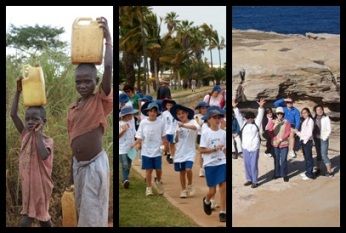I recently had the privilege of working on a voice over segment for charity organisation Open Doors’ Walk to Water campaign on September 10, 2011. The campaign encourages local Australians to gather together and walk to their nearest water supply, to raise funds for deep water boreholes being built in Northern Nigerian villages that have no access to clean drinking water.
My first read through the script took me by surprise. The accompanying movie clip features the classic images we’ve seen so many times – dirty children carrying buckets; a mother with baby on hip and water tank on head; cholera ridden faces and that overriding despair. And yet, it got me. Why is this still happening? How long have we known about this? And in our fast-shrinking, technologically advanced world, how can we forget? We switch the TV off, make ourselves a nice cup of tea and snuggle up in a bed with electric blankets. Even if we’re doing it tough and life is a struggle, (which is the truth for so many in Sydney, with soaring living expenses and dysfunctional relationships running rife), it still seems to pale in comparison to what our third world brothers and sisters face. Why is it that some of us have water running through our fingertips, and others are dying for it? It’s not as if those people chose to be born into that family, in that village, in Northern Nigeria. I didn’t get to choose my parents either. But what do we do with our privileges? A first world free country, with that most basic commodity – clean drinking water running down our drains as if it’ll never run out. Even the local playground has water fountains on hand. It’s enough to make those Nigerians green with envy – or perhaps I should say, rosy with health.
So what can we do? It’s not always practical to go over there to dig a well ourselves. I have a small daughter, a mortgage to pay – and besides, would the money for my flights be better spent on the project itself, rather than some enthusiastic white girl showing up in Northern Nigeria with a shovel?!
Yes, we should sponsor children, give to charities and help out at local events. Apparently, the average Northern Nigerian walks 8kms to find water. (Just imagine how that would mess with your daily schedule: To Do Today: 1. Find water. 2. Walk back. 3. So thirsty from the walk – drink…) Skip your gym class on Sept 10 and kill two birds with one stone (and you could donate your class cost to sponsoring a friend to go with you while you’re at it).
But, after all this I am starting to think it might be even more important just to remember. Not switch the TV off. Remember our privileges. Count our blessings. Count the spare coins (or hundreds) we can set aside this month for the organisations already involved in communities across Australia and the world, getting their hands dirty and helping out where help is really needed. In any case, by the time I got to the end of the recording session, it had me thinking. I might even do the walk. Brighton Le Sands is 11.7kms away…
To find out more, visit www.opendoors.org.au. You can make a difference.
